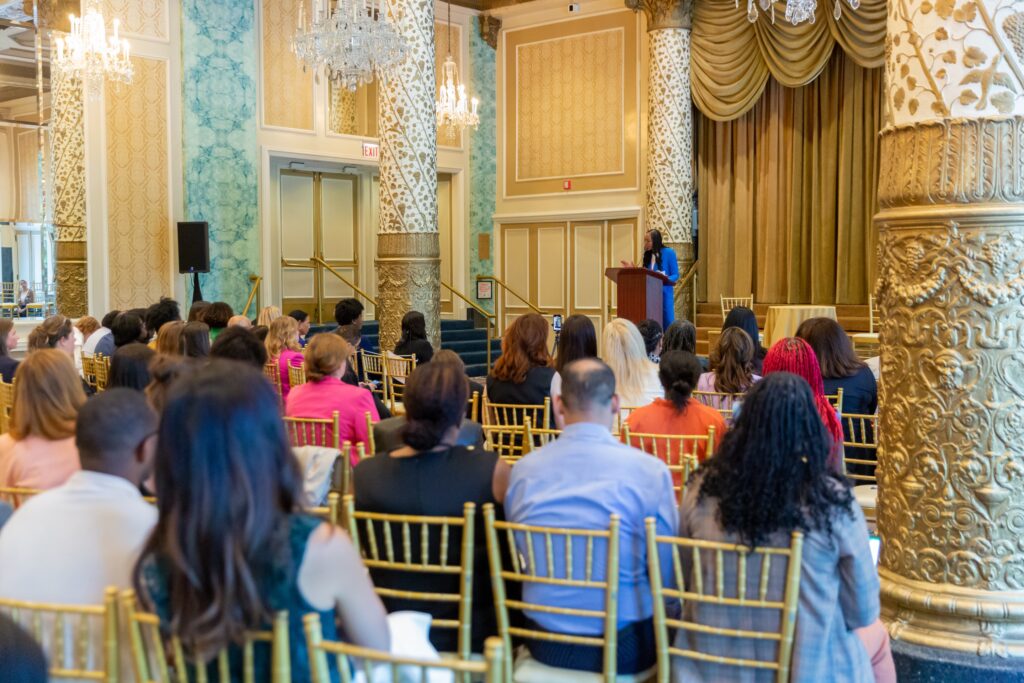
Black women are three times more likely to die from a pregnancy-related condition than White women, according to the Centers for Disease Control and Prevention (CDC). This disparity in the U.S. is being talked about more and more. However, a key message is missing in these conversations, according to one healthcare expert.
“One of the most common causes I hear for this maternal mortality crisis is a lack of access, meaning Black women are dying three times more because they are poor and don’t have access to care,” said Bayo Curry-Winchell, MD, founder of Beyond Clinical Walls and urgent care medical director at St. Mary’s Health Network. “There is just one problem with this argument: It doesn’t paint the whole picture. According to the CDC, yes, Black women are still three times more likely than White women to die from pregnancy. However, studies have shown, regardless of education and socioeconomic status, we are dying.”
Curry-Winchell made these comments during a speech at a forum called A New Era in Women’s Health Research. The event was held in Chicago on Tuesday during the Democratic National Convention.

What Are Healthcare Organizations Getting Wrong about Email Security?
A new report by Paubox calls for healthcare IT leaders to dispose of outdated assumptions about email security and address the challenges of evolving cybersecurity threats.
She added that while access to quality healthcare is indeed a problem for all groups, there are several other factors that need to be considered when it comes to the maternal health crisis. These include racial discrimination, clinician bias and limited cultural and linguistic competency.
“Access alone will not fix the deeper issues,” Curry-Winchell stated. “We need to address how care is delivered — particularly how we take in patients’ lived experiences through histories of not being heard or seen — systemic racism and how bias plays a role in treatment, delivery and policies that dictate the care patients receive.”
Unconscious bias could also be a contributor to these disparities, she said. These biases are social stereotypes people have outside of their conscious awareness. Unconscious bias is something everyone has, but “when that bias systematically impacts one group in a negative way, we need to take a deeper look, especially when that negative impacts healthcare since it can literally mean the difference between life and death,” Curry-Winchell urged.
Curry-Winchell shared that even as a Black female physician, she herself almost “became a statistic of maternal mortality.” Despite having the “most access in the world,” she almost died after giving birth to her second daughter.

The Human Algorithm: What AI Can’t Replace in Pharma Engagement
At a time when AI is reshaping pharma, Reverba Global CEO Cheryl Lubbert explained in an interview why empathy, context, and ethics still require a human touch.
“I knew something was wrong,” she said. “I could feel my body weakening, and I asked my nurse over and over, ‘Please call my doctor.’ She refused and dismissed my request, and I remember her saying, ‘Bayo, you’re fine.’ So I sat in that moment, and it got worse and worse, and I said, ‘No, please call my doctor.’ And she again said, ‘No, you’re fine.’
“So I had my husband call my doctor and say, ‘Something is wrong with Bayo.’ He came in and he knew I wasn’t myself, and he took me back to the OR and I was bleeding internally. I was transfused multiple units, and I was hospitalized for two weeks. So I have seen the face of unconscious bias and dismissal firsthand, and that is why I am here today to advocate for equity in our healthcare system.”
She underscored that in order to achieve equity, the medical industry needs to consider factors beyond access and address how bias affects care.
“This means actively listening to patients, validating their experiences, scrutinizing race-based policies and ensuring that treatment is not influenced by the preconceived notions about a patient’s race, gender, socioeconomic status or background,” Curry-Winchell stated.
Photo: Carl Ankrum






